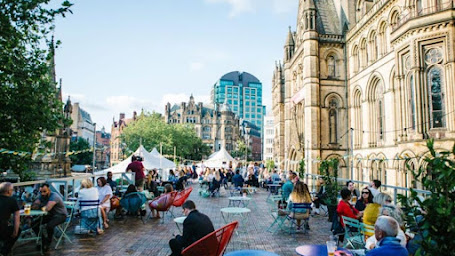Manchester's annual event resonates with themes of community and diversity. But the pandemic becomes central to the great festival.
''Your City Your Festival,'' The slogan is emblazoned on the 2,000-odd posters strung up around the city center, above pictures of ethnically diverse faces of various genders and ages.
That would be the Manchester International Festival, which, against considerable odds, in a region of England particularly affected by the pandemic, opened on schedule this month.
Since its inception in 2007, this festival has had a distinctive identity : It presents only new work, across multiple disciplines, usually through high-octane creative collaborations.
But this year, despite the [mostly virtual] presence of artists from 22 countries, the festival feels more local than international, with a strong focus on community, inclusiveness and political engagement, mostly expressed through film and the virtual arts.
The pandemics influence on this is clear. Most of the international participants have not been able to travel to Manchester to research, rehearse or perform. Live performance in theaters is still a risky gamble for producers, and the shared productions that have made ambitious projects financially possible in the past have been off the table.
About two-thirds of the 2021 program comprises planned projects that had to be reconfigured ''because artists couldn't be here, or we couldn't rely on having live audiences,'' said John McGrath, the artistic director of the festival. the remainder, he added, were new commissions that ''weren't even on our radar.'' [The $4.15 million budget is about two-thirds of the previous festival amount, he said.]
One of the reconfigured events was Boris Charmatz's ''Sea Change,'' which opened the festival. Originally planned as an out-door dance performance before 4,000 people, it instead ran for three hours along Deansgate, a wide central shopping thoroughfare.
Time slots controlled the number of onlookers strolling past the 149 performers, mostly local and nonprofessional, who were arranged in a long, continuous line down the center of the street.
As sound reverberated from the speakers along the trajectory, the performers gesticulated, shouted, whispered and contorted before running to touch and displace another in the next group, in an ongoing game of tag.
Themes emerged and mutated. One group counted down repetitively from 100; another ran in place in different ways; a third shouted out angry slogans ' ''My body, my choice!'' Bris, put, out, out!'' ''Free, free Palestine!'']. Others reached out hungrily, lat shrieking on the ground or whooped with exultation.
'' That's just how I felt after lockdown ended,'' a passerby said with a laugh to her companion.
'' All the gestures were linked to current circumstances.'' Charmatz wrote in an email after the performance. ''The anger about not being able to dance, not being able to touch one another, to be between life and death. Every participant interpreted these ideas in his or her own way.
The World Students Society thanks author Roslyn Sulcas.

.png)


0 comments:
Post a Comment
Grace A Comment!